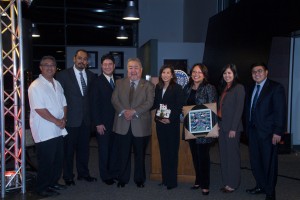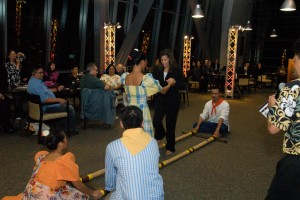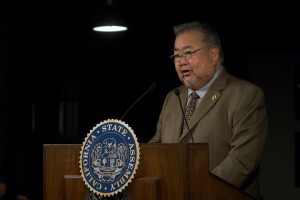A reception honoring Chief Justice nominee Tani Cantil- Sakauye and former acting Lt. Gov. Mona Pasquil, the first Filipinas to serve in two of the highest offices in California government, took place on Oct. 23 in the South Wing of the University Library at California State University, Dominguez Hills. The event, which was sponsored by the office of Assemblyman Warren Furutani (D-55th Dist.) was held in honor of October’s designation as Filipino History Month. Mitch Maki, acting associate vice president, Academic Programs, welcomed guests and underscored the significance of Cantil-Sakauye and Pasquil’s stories among the university’s population of first-generation college students.

“We take great pride not only in embracing but in promoting the power of diversity,” said Maki. “It is in that spirit [we welcome] two young women, both of whom are the granddaughters of Filipino immigrants who came to this country in search of a better… tomorrow; one who rose to become the second highest law enforcement officer in the state of California and the other who will very shortly – when we remove the ‘nominee’ from your title – become the Chief Justice for the California Supreme Court. It is a story that resonates deeply with us here at California State University, Dominguez Hills.”
The evening’s program included greetings and acknowledgements from Assemblyman Furutani, who introduced a performance by cultural dance troupe Kayamanan Ng Lahi, a look at the contributions of Filipinos to American culture by author and librarian Florante Ibanez, and speeches by Cantil- Sakauye, Pasquil, and alum Mario Carrasco (Class of ’10, M.A., negotiation, conflict resolution, and peacebuilding). The evening ended with a community-participation performance “Profits Enslave the World,” a poem by Filipino labor activist Philip Vera Cruz, which was set to music.
Carrasco, who recently began his studies at Western State University College of Law in Fullerton, said that Cantil-Sakauye’s career as a lawyer and judge is an inspiration to himself and other minority students.
“Justice Cantil-Sakauye has personally mentored many aspiring young students and professionals throughout her career,” said Carrasco. “Any minority student can find an incredible testament to her diligence and tenacity in her achievements. Here at Dominguez Hills, I have enjoyed similar mentorships and encouragement from esteemed faculty and more specifically from a handful of attorneys in the negotiation, conflict resolution, and peacebuilding master’s program.”
Furutani said that the designation of October as Filipino American Heritage Month provided a vehicle
to introduce Pasquil and Cantil-Sakauye to his district.
“They’re a part of the future, these two role models and extraordinary young women,” said Furutani. “I’m not sure if the community at large [knows] the important role that Mona Pasquil played as acting lieutenant governor. It was critical that the Democrats not give up that seat when John Garamendi, w
ent off to Congress. Mona put her career on hold to do the job of [taking] that position to look out for the best interests of a lot of people. I want to acknowledge that publicly and to also have this historic nomination of Tani Cantil-Sakauye to be recognized. I have the most Filipino Americans in my district of any district in the state. I knew that it would be very important for them to meet her and I thought it would be great for her to meet us.”
Ibanez, co-author of “Filipinos in Carson and the South Bay” (with Roselyn Estepa Ibanez), said that the achievements of Pasquil and Cantil-Sakauye “are what our pioneers – our manongs, a term of endearment and respect for an elder – believed in when they first came here in the early 1900s: the American dream of being able to rise up from
humble beginnings. Mona and Tani provide us and young and aspiring Filipino Americans of our community highly visible role models, especially for our young women, with the solid knowledge that ‘If they can do it, so can I.’”
Pasquil shared an anecdote of meeting a former White House valet from the Kennedy administration, who told her how her career raised the bar for Filipino Americans for the next generation.
“He said to me, ‘In those days, we were behind the curtain,’” said Pasquil. “’Nobody knew we were Filipinos, no one knew who we were. They only knew us by our first names. The responsibility you
have, Mona, is that you’re on the other side of the curtain. Make us proud.’
“In that instant, I thought about my grandparents,” recalled Pasquil. “I thought about them wishing the best for us and [wished] they were there to celebrate that moment with me… I wished I could touch them and say, ‘I’m on the other side of the curtain.’”
Pasquil also pointed out the historic significance of Cantil-Sakauye’s nomination.
“Think about the enormity of what election day means,” she said. “For the first time, we get to check the box next to a Filipina woman’s name for chief justice of this state. That is a phenomenal thing. That should be shared and should be something not only to encourage [voter] participation but a way to teach our young people, ‘You want something? Go for it, study hard, but go for it.’ It’s our responsibility to help our young people get there.”
Cantil- Sakauye spoke on growing up in the delta region of Sacramento and the background that she and Pasquil share of participating in Filipino community events as youth, in order to encourage them to succeed in life and preserve their heritage.
“I was learning leadership,” remembered Cantil-Sakauye. “I was learning courage. And I slowly began to appreciate my Filipino heritage. We were so rich having grown up with that kind of influence in our lives.”
“What I learned also is that Filipina women are made of titanium,” she continued. “Mona’s mom, and my mom, and my aunts – they all look like hothouse orchids. However, they taught us the Filipina values, along with our fathers. And that was to do our best, to be kind, to be inclusive. To make sure to understand that everyone has something to say, whether they’re a rich man or a poor man, whether they’re educated or not, that everyone brings something to the table, and that we can always learn
from one another.”

Cantil-Sakauye, who was good-naturedly ribbed by Furutani for being “the only Republican in my family,” explained that “the judicial branch is a non-political branch. What the right judge does is [interpret] the law. We don’t make the law, we leave that to the experts in the legislature.
“My Filipino history… and the courage of my ancestors, allow me to bring my best abilities to that task,” she said. “I live with the knowledge that I am living what my grandparents and what my mother and now my late father, had always hoped that they would have one day. The sacrifices they made for me to be here humble me and keep me grounded.”
